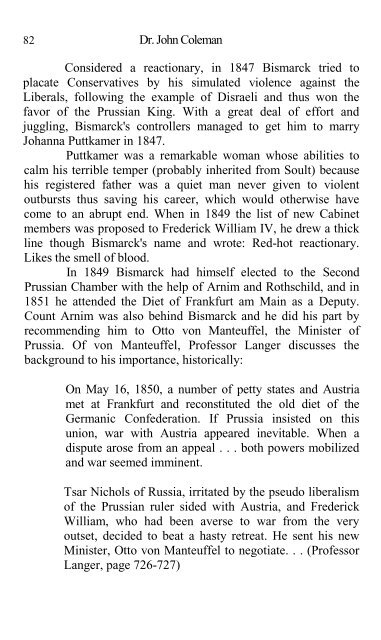coleman-the-rothschild-dynasty
coleman-the-rothschild-dynasty
coleman-the-rothschild-dynasty
You also want an ePaper? Increase the reach of your titles
YUMPU automatically turns print PDFs into web optimized ePapers that Google loves.
82 Dr. John Coleman<br />
Considered a reactionary, in 1847 Bismarck tried to<br />
placate Conservatives by his simulated violence against <strong>the</strong><br />
Liberals, following <strong>the</strong> example of Disraeli and thus won <strong>the</strong><br />
favor of <strong>the</strong> Prussian King. With a great deal of effort and<br />
juggling, Bismarck's controllers managed to get him to marry<br />
Johanna Puttkamer in 1847.<br />
Puttkamer was a remarkable woman whose abilities to<br />
calm his terrible temper (probably inherited from Soult) because<br />
his registered fa<strong>the</strong>r was a quiet man never given to violent<br />
outbursts thus saving his career, which would o<strong>the</strong>rwise have<br />
come to an abrupt end. When in 1849 <strong>the</strong> list of new Cabinet<br />
members was proposed to Frederick William IV, he drew a thick<br />
line though Bismarck's name and wrote: Red-hot reactionary.<br />
Likes <strong>the</strong> smell of blood.<br />
In 1849 Bismarck had himself elected to <strong>the</strong> Second<br />
Prussian Chamber with <strong>the</strong> help of Arnim and Rothschild, and in<br />
1851 he attended <strong>the</strong> Diet of Frankfurt am Main as a Deputy.<br />
Count Arnim was also behind Bismarck and he did his part by<br />
recommending him to Otto von Manteuffel, <strong>the</strong> Minister of<br />
Prussia. Of von Manteuffel, Professor Langer discusses <strong>the</strong><br />
background to his importance, historically:<br />
On May 16, 1850, a number of petty states and Austria<br />
met at Frankfurt and reconstituted <strong>the</strong> old diet of <strong>the</strong><br />
Germanic Confederation. If Prussia insisted on this<br />
union, war with Austria appeared inevitable. When a<br />
dispute arose from an appeal . . . both powers mobilized<br />
and war seemed imminent.<br />
Tsar Nichols of Russia, irritated by <strong>the</strong> pseudo liberalism<br />
of <strong>the</strong> Prussian ruler sided with Austria, and Frederick<br />
William, who had been averse to war from <strong>the</strong> very<br />
outset, decided to beat a hasty retreat. He sent his new<br />
Minister, Otto von Manteuffel to negotiate. . . (Professor<br />
Langer, page 726-727)


